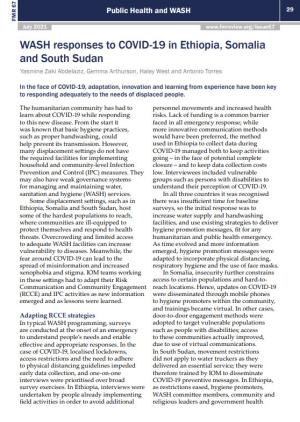The humanitarian community has had to learn about COVID-19 while responding to this new disease. From the start it was known that basic hygiene practices, such as proper handwashing, could help prevent its transmission. However, many displacement settings do not have the required facilities for implementing household and community-level Infection Prevention and Control (IPC) measures. They may also have weak governance systems for managing and maintaining water, sanitation, and hygiene (WASH) services.
Some displacement settings, such as in Ethiopia, Somalia, and South Sudan, host some of the hardest populations to reach, where communities are ill-equipped to protect themselves and respond to health threats. Overcrowding and limited access to adequate WASH facilities can increase vulnerability to diseases. Meanwhile, the fear around COVID-19 can lead to the spread of misinformation and increased xenophobia and stigma. IOM teams working in these settings had to adapt their Risk Communication and Community Engagement (RCCE) and IPC activities as new information emerged and as lessons were learned.
